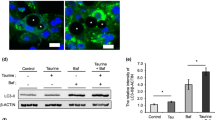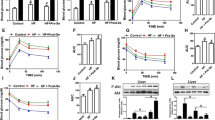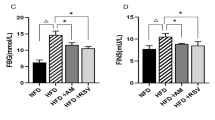Abstract
Purpose
This study aimed to determine whether resveratrol treatment alleviates endoplasmic reticulum stress and changes the expression of adipokines in adipose tissues and cells.
Methods
8-week-old male C57BL/6 mice were fed a high-calorie diet (HCD group) or high-calorie diet supplemented with resveratrol (high-calorie diet + resveratrol group) for 3 months. Insulin resistance, serum lipids and proinflammatory indices, the size and inflammatory cell infiltration in subcutaneous and visceral adipose tissues were analyzed. The gene expressions of endoplasmic reticulum stress, adipokines, and inflammatory cytokines were determined. The induced mature 3T3-L1 cells were pretreated with resveratrol and then palmitic acid, and the gene expressions of endoplasmic reticulum stress, adipokines, and inflammatory cytokines were determined.
Results
Subcutaneous and visceral adipose tissues in the high-calorie diet-fed mice exhibited adipocyte hypertrophy, inflammatory activation, and endoplasmic reticulum stress. Resveratrol alleviated high-calorie diet-induced insulin resistance and endoplasmic reticulum stress, increased expression of SIRT1, and reversed expression of adipokines in varying degrees in both subcutaneous and visceral adipose tissues. The effects of resveratrol on palmitic acid-treated adipocytes were similar to those shown in the tissues.
Conclusions
Resveratrol treatment obviously reversed adipocyte hypertrophy and insulin resistance by attenuating endoplasmic reticulum stress and inflammation, thus increasing the expression of SIRT1 and inverting the expression of adipokines in vivo and in vitro.




Similar content being viewed by others
References
R.H. Eckel, S.M. Grundy, P.Z. Zimmet, The metabolic syndrome. Lancet. 365, 1415–1428 (2005)
T. Wang, A. Jiang, Y. Guo, Y. Tan, G. Tang, M. Mai, H. Liu, J. Xiao, M. Li, X. Li, Deep sequencing of the transcriptome reveals inflammatory features of porcine visceral adipose tissue. Int. J. Biol. Sci. 9, 550–556 (2013)
B. Antuna-Puente, B. Feve, S. Fellahi, J.P. Bastard, Adipokines: the missing link between insulin resistance and obesity. Diabetes. Metab. 34, 2–11 (2008)
S.P. Weisberg, D. McCann, M. Desai, M. Rosenbaum, R.L. Leibel, A.W. Ferrante Jr., Obesity is associated with macrophage accumulation in adipose tissue. J. Clin. Invest. 112, 1796–1808 (2003)
K. Cusi, The role of adipose tissue and lipotoxicity in the pathogenesis of type 2 diabetes. Curr. Diab. Rep. 10, 306–315 (2010)
R.A. Luvizotto, A.F. Nascimento, E. Imaizumi, D.T. Pierine, S.J. Conde, C.R. Correa, K.J. Yeum, A.L. Ferreira, Lycopene supplementation modulates plasma concentrations and epididymal adipose tissue mRNA of leptin, resistin and IL-6 in diet-induced obese rats. Br. J. Nutr. 110, 1803–1809 (2013)
M.F. Gregor, G.S. Hotamisligil, Thematic review series: adipocyte biology. Adipocyte stress: the endoplasmic reticulum and metabolic disease. J. Lipid. Res. 48, 1905–1914 (2007)
N. Kawasaki, R. Asada, A. Saito, S. Kanemoto, K. Imaizumi, Obesity-induced endoplasmic reticulum stress causes chronic inflammation in adipose tissue. Sci. Rep. 2, 799 (2012)
W. Yu, Y.C. Fu, W. Wang, Cellular and molecular effects of resveratrol in health and disease. J. Cell. Biochem. 113, 752–759 (2012)
J.D. Malhotra, H. Miao, K. Zhang, A. Wolfson, S. Pennathur, S.W. Pipe, R.J. Kaufman, Antioxidants reduce endoplasmic reticulum stress and improve protein secretion. Proc. Natl. Acad. Sci. U. S. A. 105, 18525–18530 (2008)
T.W. Jung, K.T. Lee, M.W. Lee, K.H. Ka, SIRT1 attenuates palmitate-induced endoplasmic reticulum stress and insulin resistance in HepG2 cells via induction of oxygen-regulated protein 150. Biochem. Biophys. Res. Commun. 422, 229–232 (2012)
S.E. Chow, C.H. Kao, Y.T. Liu, M.L. Cheng, Y.W. Yang, Y.K. Huang, C.C. Hsu, J.S. Wang, Resveratrol induced ER expansion and ER caspase-mediated apoptosis in human nasopharyngeal carcinoma cells. Apoptosis. 19, 527–541 (2014)
L.Q. Liu, Z.Q. Fan, Y.F. Tang, Z.J. Ke, The resveratrol attenuates ethanol-induced hepatocyte apoptosis via inhibiting ER-related caspase-12 activation and PDE activity in vitro. Alcohol. Clin. Exp. Res. 38, 683–693 (2014)
C. Li, L. Wang, K. Huang, L. Zheng, Endoplasmic reticulum stress in retinal vascular degeneration: protective role of resveratrol. Invest. Ophthalmol. Vis. Sci. 53, 3241–3249 (2012)
S. Li, C. Bouzar, C. Cottet-Rousselle, I. Zagotta, F. Lamarche, M. Wabitsch, M. Tokarska-Schlattner, P. Fischer-Posovszky, Resveratrol inhibits lipogenesis of 3T3-L1 and SGBS cells by inhibition of insulin signaling and mitochondrial mass increase. Biochim. Biophys. Acta. 1857, 643–652 (2016)
M. Lagouge, C. Argmann, Z. Gerhart-Hines, H. Meziane, C. Lerin, F. Daussin, N. Messadeq, J. Milne, P. Lambert, P. Elliott, B. Geny, M. Laakso, P. Puigserver, J. Auwerx, Resveratrol improves mitochondrial function and protects against metabolic disease by activating SIRT1 and PGC-1alpha. Cell. 127, 1109–1122 (2006)
Y. Lu, L. Qian, Q. Zhang, B. Chen, L. Gui, D. Huang, G. Chen, L. Chen, Palmitate induces apoptosis in mouse aortic endothelial cells and endothelial dysfunction in mice fed high-calorie and high-cholesterol diets. Life. Sci. 92, 1165–1173 (2013)
L.D. Han, J.F. Xia, Q.L. Liang, Y. Wang, Y.M. Wang, P. Hu, P. Li, G.A. Luo, Plasma esterified and non-esterified fatty acids metabolic profiling using gas-chromatography mass spectrometry and its application in the study of diabetic mellitus and diabetic nephropathy. Anal. Chim. Acta. 689, 85–91 (2011)
Y. Lu, J. Cheng, L. Chen, C. Li, G. Chen, L. Gui, B. Shen, Q. Zhang, Endoplasmic reticulum stress involved in high-fat diet and palmitic acid-induced vascular damages and fenofibrate intervention. Biochem. Biophys. Res. Commun. 458, 1–7 (2015)
L.D. Williams, G.A. Burdock, J.A. Edwards, M. Beck, J. Bausch, Safety studies conducted on high-purity transresveratrol in experimental animals. Food. Chem. Toxicol. 47, 2170–2182 (2009)
M.T. Macarulla, G. Alberdi, S. Gómez, I. Tueros, C. Bald, V.M. Rodríguez, J.A. Martínez, M.P. Portillo, Effects of different doses of resveratrol on body fat and serum parameters in rats fed a hypercaloric diet. J. Physiol. Biochem. 65, 369–376 (2009)
A. Dal-Pan, S. Blanc, E. Aujard, Resveratrol suppresses body mass gain in a seasonal non-human primate model of obesity. BMC. Physiol. 10, 11 (2010)
S. Timmers, E. Konings, L. Bilet, R.H. Houtkooper, T. van de Weijer, G.H. Goossens, J. Hoeks, S. van der Krieken, D. Ryu, S. Kersten, E. Moonen-Kornips, M.K. Hesselink, I. Kunz, V.B. Schrauwen-Hinderling, E.E. Blaak, J. Auwerx, P. Schrauwen, Calorie restriction-like effects of 30 days of resveratrol supplementation on energy metabolism and metabolic profiles in obese humans. Cell. Metab. 14, 612–622 (2011)
Y. Jimenez-Gomez, J.A. Mattison, K.J. Pearson, A. Martin-Montalvo, H.H. Palacios, A.M. Sossong, T.M. Ward, C.M. Younts, K. Lewis, J.S. Allard, D.L. Longo, J.P. Belman, M.M. Malagon, P. Navas, M. Sanghvi, R. Moaddel, E.M. Tilmont, R.L. Herbert, C.H. Morrell, J.M. Egan, J.A. Baur, L. Ferrucci, J.S. Bogan, M. Bernier, R. de Cabo, Resveratrol improves adipose insulin signaling and reduces the inflammatory response in adipose tissue of rhesus monkeys on high-fat, high-sugar diet. Cell. Metab. 18, 533–545 (2013)
J. Olholm, S.K. Paulsen, K.B. Cullberg, B. Richelsen, S.B. Pedersen, Anti-inflammatory effect of resveratrol on adipokine expression and secretion in human adipose tissue explant. Int. J. Obes. 34, 1546–1553 (2010)
Z.E. Floyd, Z.Q. Wang, G. Kilroy, W.T. Cefalu, Modulation of peroxisome proliferator activated receptor gamma stability and transcriptional activity in adipocytes by resveratrol. Metabolism. 57, S32–S38 (2008)
G. Scapagnini, S. Davinelli, T. Kaneko, G. Koverech, A. Koverech, E.J. Calabrese, V. Calabrese, Dose response biology of resveratrol in obesity. J. Cell. Commun. Signal. 8, 385–391 (2014)
J. Mercader, A. Palou, M.L. Bonet, Resveratrol enhances fatty acid oxidation capacity and reduces resistin and Retinol-Binding Protein 4 expression in white adipocytes. J. Nutr. Biochem. 22, 828–834 (2011)
U. Ozcan, Q. Cao, E. Yilmaz, A.H. Lee, N.N. Iwakoshi, E. Ozdelen, G. Tuncman, C. Görgün, L.H. Glimcher, G.S. Hotamisligil, Endoplasmic reticulum stress links obesity, insulin action, and type 2 diabetes. Science 306, 457–461 (2004)
W. Guo, S. Wong, W. Xie, T. Lei, Z. Luo, Palmitate modulates intracellular signaling, induces endoplasmic reticulum stress, and causes apoptosis in mouse 3T3-L1 and rat primary preadipocytes. Am. J. Physiol. Endocrinol. Metab. 293, E576–586 (2007)
S. Li, C. Bouzar, C. Cottet-Rousselle, I. Zagotta, F. Lamarche, M. Wabitsch, M. Tokarska-Schlattner, P. Fischer-Posovszky, U. Schlattner, D.R. Rousseau, esveratrol inhibits lipogenesis of 3T3-L1 and SGBS cells by inhibition of insulin signaling and mitochondrial mass increase. Biochim. Biophys. Acta 1857, 643–652 (2016)
C.S. Andrews, S. Matsuyama, B.C. Lee, J.D. Li, Resveratrol suppresses NTHi-induced inflammation via up-regulation of the negative regulator MyD88 short. Sci. Rep. 6, 34445 (2016)
T. Suganami, J. Nishida, Y. Ogawa, A paracrine loop between adipocytes and macrophages aggravates inflammatory changes: role of free fatty acids and tumor necrosis factor alpha. Arterioscler. Thromb. Vasc. Biol. 25, 2062–2068 (2005)
A. Tchernof, J.P. Després, Pathophysiology of human visceral obesity: an update. Physiol. Rev. 93, 359–404 (2013)
J.S. Burrill, E.K. Long, B. Reilly, Y. Deng, I.M. Armitage, P.E. Scherer, D.A. Bernlohr, Inflammation and ER stress regulate branched-chain amino acid uptake and metabolism in adipocytes. Mol. Endocrinol. 29, 411–420 (2015)
Z.M. Lv, Q. Wang, Y.H. Chen, S.H. Wang, D.Q. Huang, Resveratrol attenuates inflammation and oxidative stress in epididymal white adipose tissue: implications for its involvement in improving steroidogenesis in diet-induced obese mice. Mol. Reprod. Dev. 82, 321–328 (2015)
E. Melloni, G. Zauli, C. Celeghini, I. Volpi, P. Secchiero, Release of a specific set of proinflammatory adipokines by differentiating 3T3-L1 cells. Nutrition. 1, 332–327 (2013)
K.D. McCall, D. Holliday, E. Dickerson, B. Wallace, A.L. Schwartz, C. Schwartz, C.J. Lewis, L.D. Kohn, F.L. Schwartz, Phenylmethimazole blocks palmitate-mediated induction of inflammatory cytokine pathways in 3T3L1 adipocytes and RAW 264.7 macrophages. J. Endocrinol. 207, 343–353 (2010)
Funding
This study was funded by research grants from Anhui Natural Science Foundation of China (1308085MH154 and 1608085MH208, 1608085QH205) and a special foundation of the National TCM Clinical Research Base (JDZX2015129).
Author information
Authors and Affiliations
Corresponding author
Ethics declarations
Conflict of interest
The authors state no conflict of interest. The authors alone are responsible for the content and writing of this paper.
Ethical approval
All applicable international, national, and/or institutional guidelines for the care and use of animals were followed.
Additional information
Li Chen and Ting Wang contributed equally to this work.
Rights and permissions
About this article
Cite this article
Chen, L., Wang, T., Chen, G. et al. Influence of resveratrol on endoplasmic reticulum stress and expression of adipokines in adipose tissues/adipocytes induced by high-calorie diet or palmitic acid. Endocrine 55, 773–785 (2017). https://doi.org/10.1007/s12020-016-1212-2
Received:
Accepted:
Published:
Issue Date:
DOI: https://doi.org/10.1007/s12020-016-1212-2




